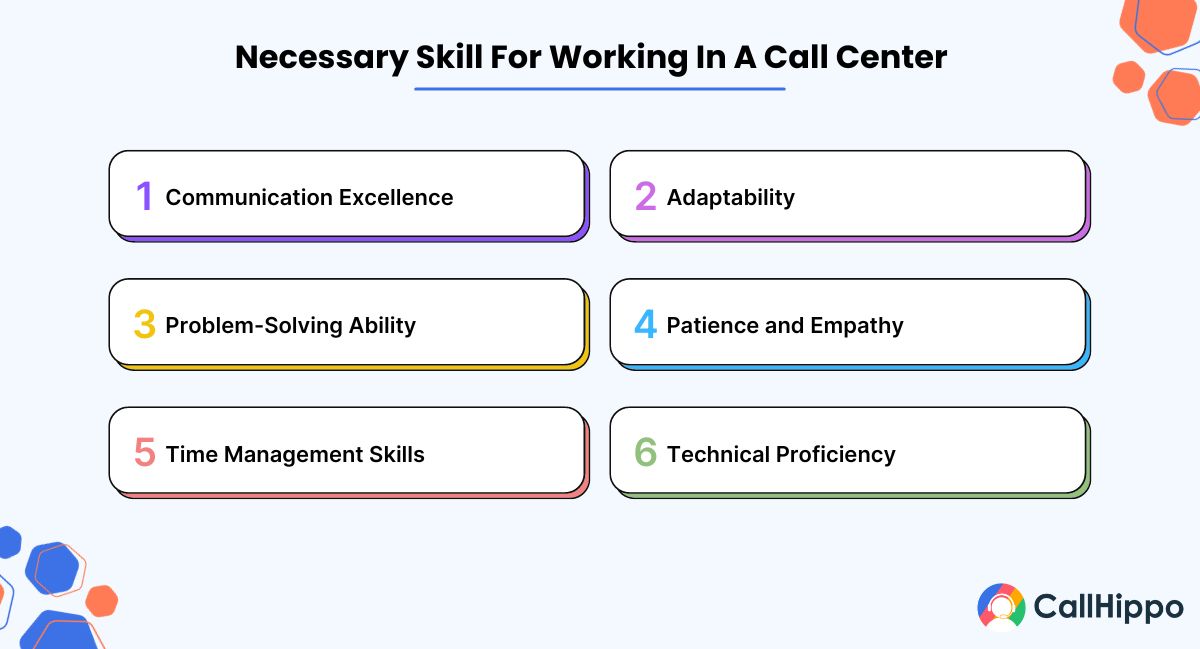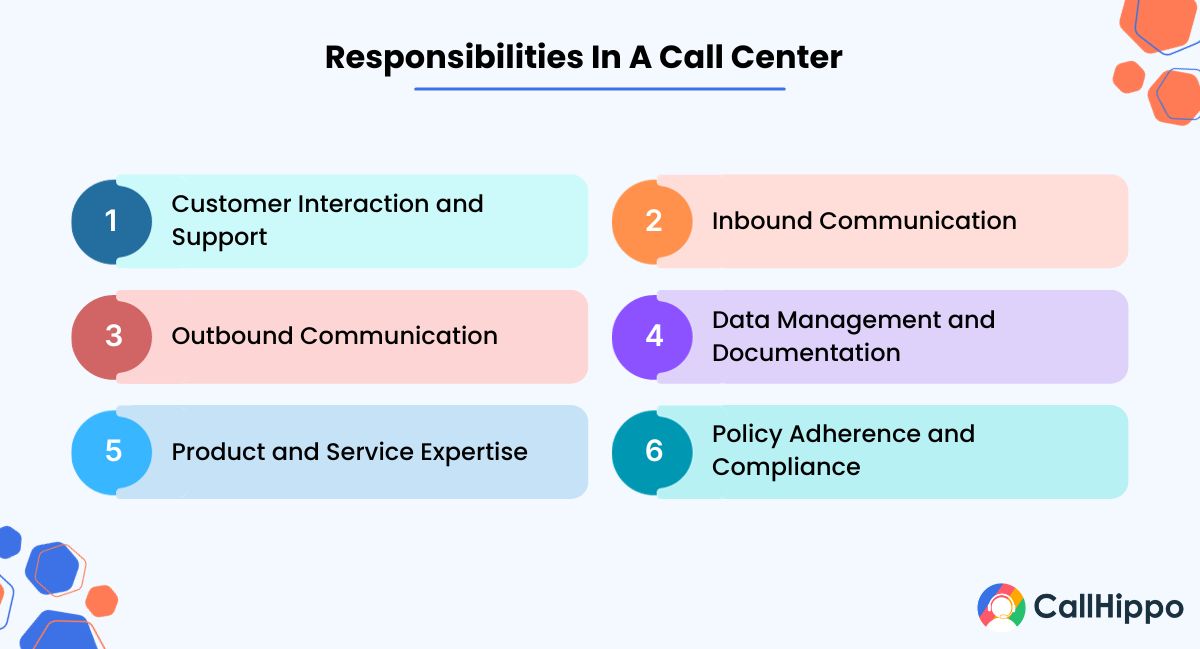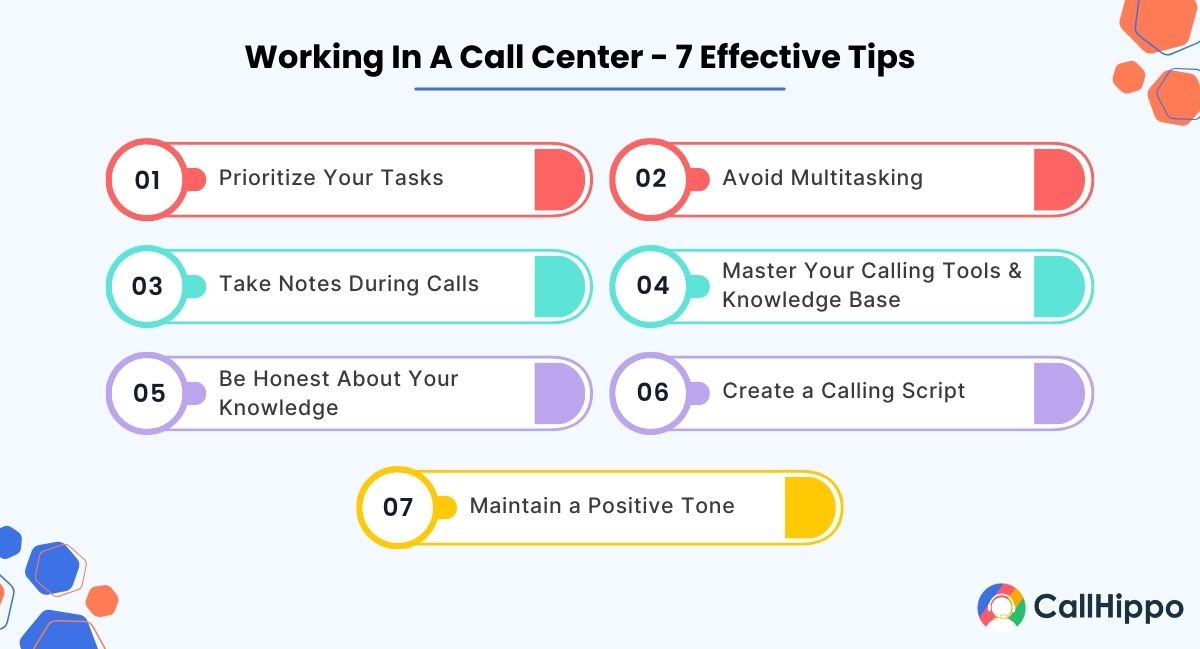Call centers, which act as focal points for client connection, are essential to the contemporary business landscape. They are essential in providing aid, support, and information to a variety of sectors. Customers looking for information, solutions, or just a kind voice typically contact these busy centers. Their importance goes beyond answering questions; call centers act as the vital link between a business and its customers. “According to research, 59% of customers believe that live calls are the best approach to resolve their concerns and problems.” Call center agents, or front-line personnel, are responsible for providing excellent customer service. This job requires more than simply the ability to speak on the phone. It necessitates excellent problem-solving ability, as well as efficient communication capabilities.
"When working in a call center, remember to acknowledge customer emotions while addressing their needs efficiently. In a call center, empathy-driven communication maintains both customer satisfaction and productivity. You can foster positive interactions and successfully navigate the demands of this dynamic work environment by recognizing and valuing emotions."
How Does a Call Center Work?
Customers can contact a company and voice their requests or complaints through a call center since it acts as an important channel of communication. In a call center, a customer service representative is on hand to take calls from clients looking for help with particular problems. The majority of contact centers run on a comparable, responsive technology, while some may have distinctive features. To provide a more detailed understanding of the calling process, let’s break it down into three key steps.
1. Customer Makes the Call
The customer service process begins when a consumer contacts the support team, either by phone or through a product or app. For your convenience, certain call centers provide callbacks. When the call arrives at the call center, it is filtered and routed by software or a live agent. This phase assists in assessing the customer’s problem and routes the call to a designated agent. This procedure is very useful for call centers dealing with complex or specialized issues. It ensures calls reach the right agent, reducing case resolution time and boosting customer satisfaction with swift, targeted support.
2. The Representative Works on the Customer’s Issue
When the designated customer service representative receives the call, they are crucial to problem-solving. To understand and meet client demands, effective agents combine experience, product expertise, and great communication skills. In order to ensure that the consumer understands and accepts the solution, customer service goes beyond simply finding the best answer. The main goal of the call is to settle the problem within this initial exchange. Demonstrating to existing customers and clients that their issues are immediately addressed is essential for lowering the risk of customer churn. Customer loyalty is increased by prompt and satisfactory solutions since happy consumers are more likely to stick around.
3. The Representative Follows Up
Although it is the agent’s aim to fix the problem during the first call, this isn’t always possible. Sometimes, it’s necessary to end the call with a promise to follow up due to the complexity of the problem or a lack of information. Once they have gathered additional information or come up with a solution, the agent follows up with the customer again. To make sure that the customer’s issue is ultimately resolved to their satisfaction, follow-up is crucial. It demonstrates the call center team’s dedication to providing excellent customer service and that the needs of the client have not been overlooked. Customers contact call centers with requests and complaints, and call center agents to work hard to resolve all these issues. Successful call centers rely on proficient agents delivering efficient customer support for positive experiences and business success.
Working in a Call Center: Necessary Skills for Success
Call centers grab a crucial spot in today’s dynamic business globe because they’re where customers get help. The people who work there, called agents, need to be really good at what they do. Moreover, a call center manager can also help resolve all your problems. It doesn’t matter if you’re a pro or new to working for a call center; you need to know what skills you need. Different call center jobs may have different tasks, but the important skills are pretty much the same.

Since now you are well aware of how a call center works, it’s time to take a look at some of the common skills that everyone in a call center should have:
1. Communication Excellence
Effective communication is crucial to many call center operations. The primary point of interaction between a business and its customers is through call center agents. They must have the ability to convey information clearly both orally and in writing. Mastering customer service telephone skills is essential for delivering professional and effective phone interactions, ensuring customers feel valued and heard.
Clarity and empathy are crucial in phone discussions, whereas professionalism and accuracy are crucial in written communication (such as email or live chat). Customer concerns should also be understood, and agents should respond sympathetically. It’s crucial to grasp these various communication channels to deliver excellent customer service and ensure clients feel valued and heard.
2. Adaptability
Continual change is a characteristic of dynamic environments like call centers. Agents must be ready to learn and adapt as new technology and systems are introduced to streamline operations. Beyond just being able to handle a variety of tasks, adaptability entails embracing change and remaining adaptable in the face of shifting customer needs and new technological developments. Call center agents that adapt swiftly to new situations and technologies stay productive and deliver excellent customer service channels even in rapidly evolving environments.
3. Problem-Solving Ability
Customers rely on call center agents to solve their problems. They must identify and resolve issues quickly while maintaining a high level of professionalism. Problem-solving ability necessitates a thorough understanding of the company’s products and services, allowing agents to provide accurate information and solutions. Customers frequently seek assistance when they face difficulties, so the ability to remain calm under pressure is critical. When combined with a calm demeanor, problem-solving abilities can transform customer concerns into satisfied resolutions, leaving a positive impression and building customer loyalty.
4. Patience and Empathy
A call center agent routinely interacts with irritated or angry clients, and their ability to stay patient and empathic can transform unfavorable situations into positive ones. Patience entails remaining calm and collected in the face of agitated clients, whereas empathy entails truly understanding and appreciating the customer’s worries. Empathy promotes positive client views and improves the whole customer experience. Call center agents may develop trust and foster long-term loyalty by demonstrating that they care and can relate to client difficulties.
You May Also Read : Empathy Statements for Customer Service
5. Time Management Skills
The key to success in a fast-paced call center is time management. Agents generally handle a large amount of consumer queries while juggling numerous jobs. To achieve performance targets for call resolution and response times, effective time management is crucial. It entails effectively managing workloads, setting priorities, and keeping accurate records. Time management not only boosts output but also lowers stress levels and guarantees constant service quality. Call center managers and employees can help clients promptly and effectively by effectively managing their time, which boosts customer happiness and corporate profitability.
6. Technical Proficiency
To provide successful customer service, call center operators rely on a variety of software tools and systems. Accessing client data, providing quick and accurate responses, and maintaining detailed call logs all need proficiency in these tools. Aside from that, agents must have basic computer skills, such as keyboard shortcuts, data entry, and site browsing. Technical expertise ensures that agents can respond to client inquiries and concerns efficiently, optimize operations, and make the best use of available resources. It is critical to be comfortable with the technical parts of the job in order to provide high-quality service and have great relationships with customers.
What Are Your Responsibilities at a Call Center?
Call center agents play an important role in ensuring that a firm and its customers communicate effectively and receive quality service. These individuals are given a wide range of responsibilities.

Some of the most common ones for call center reps include:
1. Customer Interaction and Support
Call center agents are a company’s first point of contact when it comes to customer service and interaction. Their main responsibility is to interact with consumers, responding to their needs for support, information, and solutions. This requires developing good communication skills, actively and empathically listening, and making sure that every customer has a positive and productive experience. Agents are charged with the vital duty of providing great service, whether consumers are looking for product details, resolving problems, or simply making inquiries. Their capacity to foster a welcoming environment is crucial to establishing and sustaining client loyalty and pleasure.
2. Inbound Communication
One of the most important aspects of a contact center agent’s job is inbound communication. It entails handling incoming calls from clients and taking them. These conversations include a broad range of requirements and questions, from straightforward questions to complex problem-solving. Agents are responsible for politely and swiftly returning these calls. They need to be adept at active listening, understanding client needs, and providing pertinent responses or assistance if they want to excel at this role.
3. Outbound Communication
Outbound communication is primarily used by call center agents to reach clients for a variety of reasons. Making follow-up calls, conducting surveys, selling products or services, or scheduling appointments are all examples of this. Outbound calls necessitate a professional and persuasive tone. Agents must be adept at engaging customers effectively as they take the initiative to reach out and deliver essential information. Creating engaging, respectful interactions on outbound calls is crucial for the call center’s success, whether promoting new products or gathering customer feedback.
4. Data Management and Documentation
Almost all call center operations are centered on efficient data handling and documentation. All customer interactions and relevant data must be accurately recorded by agents in the call center’s database or Customer Relationship Management (CRM) system. This thorough documentation acts as a priceless historical record, enabling trend research, following customer complaints, and offering a comprehensive resource for future reference and follow-ups. Call center representatives are responsible for keeping records accurate and thorough.
5. Product and Service Expertise
Call center agents must have a solid awareness of their company’s products and services. This expertise is critical for giving accurate and thorough information to customers. Agents receive monthly training and updates to keep them up to date on the company’s latest advancements and improvements. Through accurate, dependable responses, product and service knowledge instills client confidence.
6. Policy Adherence and Compliance
In a call center environment, adherence to corporate standards, regulations, and processes is essential. Agents must strictly follow set protocols, like using predefined scripts for common questions, following issue escalation guidelines, and maintaining service standards.
Less Than 3 Minutes

What Are The Pros and Cons of Working in a Call Center?
Working at a call center is a complex terrain with a wide range of advantages and disadvantages. Some of the most common pros and cons are listed below. Let’s take a closer look at them!
Pros
1. Develop Interpersonal Skills
Your interpersonal skills will definitely improve if you work in a contact center. Agents in many call centers interact with a diverse range of clients, each with their own requirements and characteristics. This ongoing commitment fosters excellent customer service, efficient communication, and problem-solving skills. These skills are not only useful in the workplace but also in personal interactions, improving your overall communication and conflict resolution abilities. You gain valuable skills as you learn to constantly navigate various customer concerns.
2. Earn Bonuses and Commissions
High-performing employees at call centers are frequently given financial incentives, frequently in the form of bonuses and commissions. For instance, if you work in a call center that prioritizes sales, you might be paid commissions based on how many sales you bring in. These financial benefits can significantly increase your income and act as a strong incentive to perform well in your call center position. Exceeding performance goals not only boosts your income but also offers a sense of accomplishment, making call center work financially rewarding. Explore Opportunities for Growth Call centers provide numerous opportunities for career advancement. Starting as a call center representative, you can advance to supervisory or managerial positions. You may locate positions in various departments, such as quality assurance, training, or workforce management, by accumulating experience and showing your strengths. This internal vertical and lateral mobility is especially appealing to individuals seeking long-term career advancement. It allows you to broaden your skill set and take on new responsibilities, eventually leading to more major roles and responsibilities within the firm.
Cons
1. Handle Frequent Changes
Since the call center work is dynamic, you need to adjust to numerous changes. People who prefer consistency and predictability in their workplace may find it challenging as policies, technologies, and team structures can change quickly. It might be stressful to adjust to these changes, and some workers might find it challenging to consistently feel stable and routine in their jobs.
2. Experience Burnout and Stress
The fast-paced, high-pressure environment of call centers can often lead to employee burnout and stress. Managing irate customers, meeting demanding performance metrics, and working under time constraints can all have a negative impact on your emotional well-being. It’s essential to build powerful coping mechanisms and stress management techniques if you want to succeed in this atmosphere. Job satisfaction might suffer from burnout, which can increase the industry’s personnel turnover rates.
3. Work an Irregular Schedule
Numerous call centers operate around the clock, so employees are required to work erratic hours, including on the weekends, holidays, and evenings. This unpredictable schedule can make it difficult to maintain a healthy work-life balance, establish a regular routine, and find time for friends and family. Particularly at night, shifts can disrupt sleep patterns and cause a number of health problems. For those who value a standard 9 to 5 workday and prefer a more stable work routine, the unpredictable work schedule can be a significant disadvantage.
Recommended Read: Different Types of Call Center
Tips for Working in a Call Center
Customers seeking assistance, information, or resolution to their problems frequently contact call center agents as their first point of contact. Effective strategies and techniques are required to excel in this role.

Some of the best tips for working in a call center include:
1. Prioritize Your Tasks with a To-Do List
It can be difficult to manage the constant flow of customer inquiries while working in a call center. Make a to-do list immediately if you want to stay on top of your organization and keep control of your workload. Using this excellent tool, you may outline your daily chores and prioritize them. By doing so, you may identify which chores must be accomplished immediately and which can wait. The act of crossing off finished tasks provides you with a sense of success and considerably boosts your confidence.
2. Avoid Multitasking
It’s common to feel the pressure to multitask in the fast-paced environment of a call center. Multitasking, on the other hand, can lead to decreased focus and an increase in errors. Allocating specific time blocks for individual tasks is a more effective approach. Focus, for example, on one call at a time, addressing the issue thoroughly before moving on to the next. Using productivity tools can help you manage your tasks more effectively while avoiding the pitfalls of multitasking.
3. Take Notes During Calls
Taking effective notes during customer interactions is critical in a call center to maintain a high level of customer service. Instead of waiting until the call is over to write down specifics, take notes during it. This strategy has several advantages. It helps you remember important details, recommendations, and client preferences, resulting in more personalized service. Taking notes during calls can also significantly reduce the amount of time required for After-Call Work (ACW). You can speed up the process by adding real-time notes to the call log. You can respond to customer requests and inquiries more quickly if you take notes ahead of time and ensure that no important customer information ever is overlooked.
4. Master Your Calling Tools and Knowledge Base
The efficiency of a call center is largely determined by your familiarity with the dialing tools and thorough knowledge of your company’s products or services. Invest time in learning the ins and outs of your phone systems and gaining a thorough understanding of your offerings to impress customers and boost your confidence. This knowledge allows you to reply to consumer inquiries quickly and properly, minimizing the need for significant study or the assistance of coworkers. Mastery of calling tools ensures that you can navigate systems quickly, providing customers with a consistent experience.
5. Be Honest About Your Knowledge
In the call center industry, professionalism and honesty are paramount. It’s perfectly acceptable not to have all of the solutions to client questions. It’s important to avoid implying inexperience, though. Be transparent with customers when you lack an answer, ensuring them of your commitment to locating a solution or connecting them with an expert. This open strategy fosters customer trust by demonstrating your dedication to supporting them regardless of your position. It’s crucial to avoid mentioning that you’re new to the position because doing so might cast doubt on your competence.
6. Create a Calling Script
Call scripts are extremely useful resources for call center agents, especially when dealing with a high volume of calls. During busy times, a structured script guides responses to common questions, helps with difficult situations, and addresses objections. These scripts ensure that your approach is consistent, ensuring that customer interactions are efficient, effective, and in line with your company’s standards. Scripts become indispensable tools by including answers to frequently asked questions, methods for dealing with difficult customers, and tactics for dealing with sales objections.
7. Maintain a Positive Tone
In a call center, the tone of your voice has a significant impact on how customers interact with you. For customers to have a positive and fruitful experience, your speech must be upbeat, collected, and friendly. Customers may feel rushed and anxious when speakers speak quickly or with frustration. Speaking slowly, clearly, and in a friendly manner, on the other hand, communicates attention to detail and a desire to help. This upbeat attitude fosters a welcoming environment that puts clients at ease and raises their level of satisfaction overall.
Conclusion
Working in a call center is both challenging and rewarding. To flourish in this multidimensional profession, one must learn the necessary abilities, accept responsibilities, and appreciate the importance of their part in the entire customer experience. Effective organization, excellent communication skills, and adaptation lead to personal progress and a pleasant client experience, resulting in success. Connect with our expert and learn more about call centers today!
FAQs
1. What Strategies Can Help in Dealing With Difficult Customers?
Being patient, actively listening, and empathetic are necessary while working with challenging clients. Techniques include remaining composed, acknowledging their worries, providing solutions, and keeping an optimistic outlook. De-escalation and effective communication strategies are crucial for problem-solving and ensuring client satisfaction.
2. What Work to Do in the Call Center?
Employees at call centers use telephone calls to answer questions from customers, address problems, and offer support. Outbound phone calls may also be made by them for telemarketing, surveys, or appointment setting. Answering inquiries, processing orders, handling grievances, and maintaining a great customer experience are just a few of the call center tasks.

Subscribe to our newsletter & never miss our latest news and promotions.









